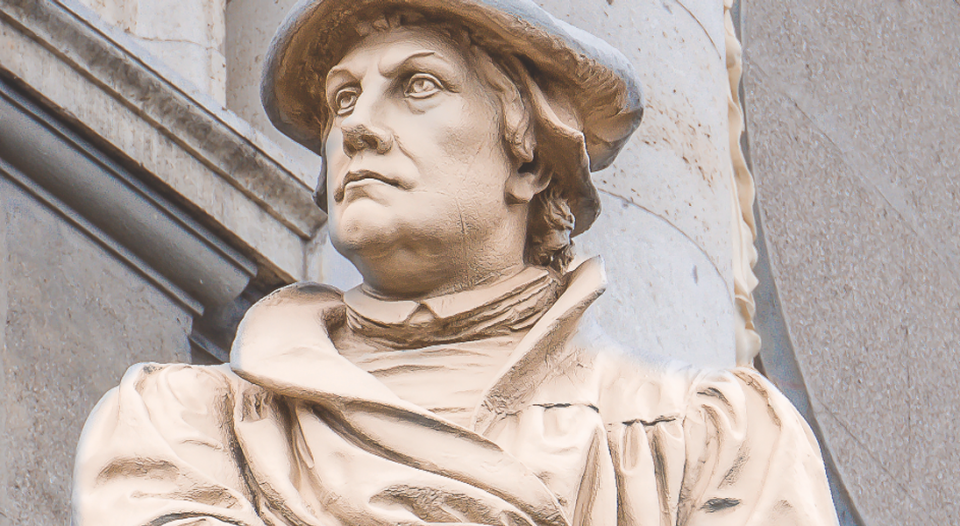Series editor’s note: Throughout 2024, “Deeper understandings” will feature teaching scholars of the ELCA reflecting on the many ways that Lutheran theology makes a difference for our daily lives. —Kristin Johnston Largen, president of Wartburg Theological Seminary, Dubuque, Iowa, on behalf of the ELCA’s seminaries
We all know what it feels like to be diminished by others—to have our identity reduced to one mistake or one bad habit; to be dismissed, perhaps before we’ve even introduced ourselves, on account of our job, or our appearance or our background.
Not only do we all know what it feels like to be diminished by others, we all know what it feels like to diminish ourselves—to doubt or deny our own goodness or worth or contribution to the world. And, if we are honest, we know that we are all guilty of diminishing others. In these seasons of political and social strife, stereotyping and disparaging labels are used to reduce others and render them manageable. It’s hard to treat a person, in all their depth and complexity, as a policy problem. But it’s less hard to treat the “illegal” as such, so that is the label some people are given in such political calculations.
God’s law, which shows us our brokenness and separation from God and others, forbids us to diminish others. Perhaps that is obvious. However, what I want to explore in this brief space is how the gospel transforms us such that we also are able to reject the diminishing of ourselves—so that we can be all we can be for others. Drawing from Martin Luther’s The Freedom of a Christian (1520), I believe we live most fully into the gospel when we realize that two seemingly disparate questions are in fact the same question: How can I be the person Jesus Christ freed me to be? And how can I help others realize their full personhood?
How can I be the person Jesus Christ freed me to be? And how can I help others realize their full personhood?
The “Christian freedom” that Luther proclaimed included freedom from—freedom from fear of eternal condemnation on account of our sins, freedom from fear of God’s law and freedom from human laws and traditions that specified which works and ways of life were most pleasing to God. Above all, freedom from the long-established teaching that God preferred Christians to be celibate and separate from ordinary society meant that Christians were free to participate joyfully in marriage, government, the production of useful goods, trade and so forth.
Luther thus announced that the Christian, freed by faith, was “Lord over all” and “servant of all” at the same time: Christians were freed to choose the way of life that best expressed their faith in Christ through love and service of others. This is the opposite of diminishment: this is the expansion of possibilities for being self in relation to others.
Freedom from and freedom for
In The Freedom of a Christian, before Luther turns to describing how the freed Christian “Lord” is also servant, he delineates three powers of faith. First, the believing soul is “saturated and intoxicated” by God’s promises and re-formed by the word. Second, the believing soul trusts God as entirely truthful and good—indeed, Luther teaches that faith itself is trust that God has chosen us as God’s own through Christ, and this entails submission to God’s always-good will. Finally, third, the soul by faith is married to Christ so that it receives Christ’s “grace, life, and salvation,” while he takes on the soul’s “sins, death, and damnation.” This “happy exchange,” for Luther, is no less real than the exchange of divine and human properties in Christ’s own nature.
Faith empowers human beings by making them the image of God through Christ. Luther thus describes how the Christian married to Christ becomes Christ for others, and he goes so far as to say that believers have a Godlike sufficiency: they need nothing more than faith and Christ to live eternally and happily, so they, like God in Christ, pour themselves out in love toward others. They give themselves to their neighbors, taking on their neighbors’ burdens and giving their neighbor all their good things. This, too, is a very real exchange.
Faith empowers human beings by making them the image of God through Christ.
We must admit here that Luther himself could diminish people: Luther declared “freedom” to the German peasantry but denied that they could claim any identity beyond “peasant” and “subject.” This failing serves as a warning for us to avoid diminishing self and other, and to instead embrace and explore the rich vision of self and other birthed in us by faith’s power.
Lutherans know that the gospel is to have the final say in our lives, not the law. But with the gospel itself, we too often rest in the freedom from that the gospel gives—freedom from anxiety about God’s love, freedom from works-religion—without exploring the freedom for, that is, the transformative power and possibility of marriage with Christ.
This marriage to Christ frees us from human diminishment, including our diminishment of ourselves, such that we are able to be the person God has created and called us to be. And this freedom sends us forth not to define what others should be (which would be to diminish them according to our limited perception and imagination of their possibilities) but to invite them to show us what they are, to ensure that the conditions of flourishing selfhood are there for them too.
Get this column in your inbox: Visit livinglutheran.org/subscribe and sign up for the free email digest “LL Stories.” Receive the digest weekly, biweekly or monthly, and select the categories that interest you. (“Deeper understandings” is a “Voices of faith” column.)



